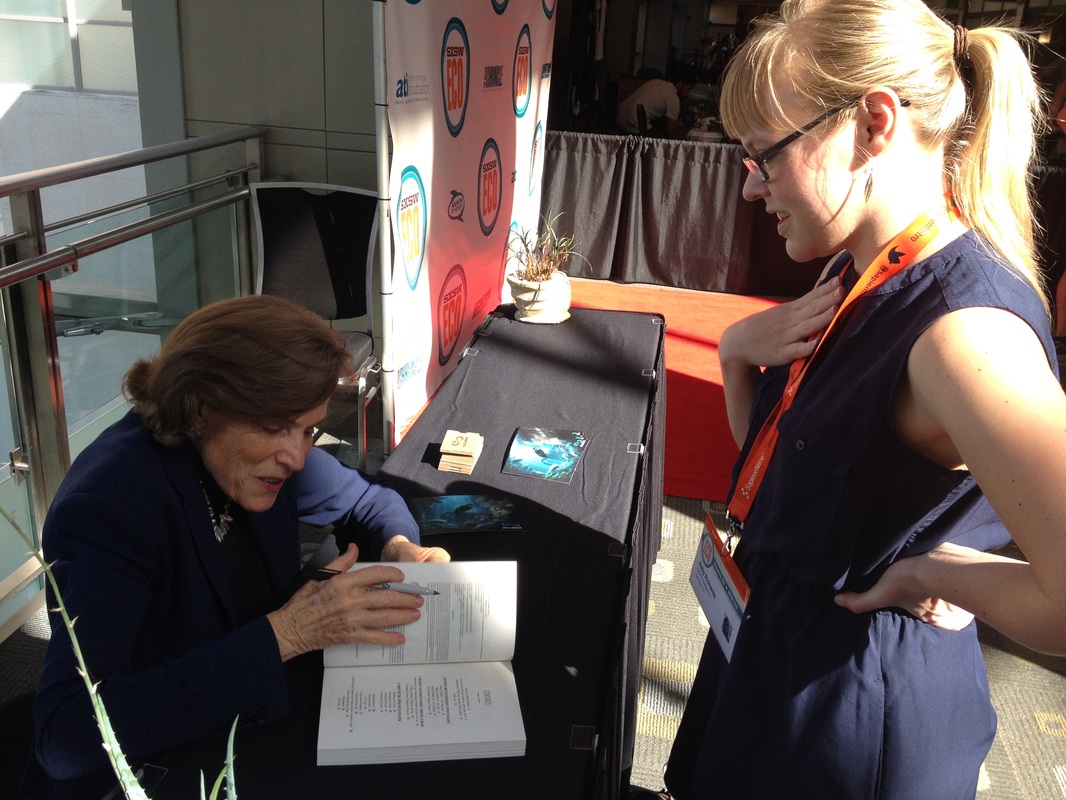When I heard that a biologist was giving a keynote on the oceans on day two of SXSWeco, I thought, alright. I sat in on Monday for the keynote given by Boeing. It was interesting. Fine.
Can I be totally honest here? She blew my mind. It doesn't make any difference whether you like science or not. She is a role model for any person, but being a woman, I think of young girls. She pushed through barriers and stepped out of her comfort zone because she loved her work, not because she wanted attention.
If you don't care about the oceans and the earth, and you don't want to care, you should probably stay far away.
But if you do...
I think around 42:00 is when I started tearing up - and the emotion didn't stop until well after I had met her afterward. Who am I kidding? I am still feeling inspired.
Dr. Earleisms
- No water, no life. No blue, no green.
- We have a planet and ocean that is in trouble. The ocean is not too big to fail.
- Our past, our present, and whatever remains of our future, absolutely depend on what we do now.
- We're really good at killing. We need to get better at caring.
- I come from the preplasticazoic. I know that people lived without plastics. I know that for most of our history, because plastics didn't arrive until the middle of the 20th century, now they pervade not just our lives in a positive sense, but they have gone into the ocean in a negative sense. And now they're there. They are part of not just the present, but the future. As Jackson Brown sings in a new song that is on his most recent album, "If I could be anywhere in time, it would be now" but one of the lines in that song is, "All the plastic ever made is still here." It doesn't just go away. It's an inheritance, right down to the molecular level, very stable molecules that we have synthesized, and that are now a part of our world, part of our future. What were we thinking? Well, I think we weren't thinking. That throwing things "away" would make a difference. It seemed like a good business model. You use things once, throw it away, that means you have to make more, and then make more, and then make more. Except that, there is no "away" on earth, as we now know.
For more, check out her recent documentary, Mission Blue, available on Netflix (Trailer), or her book, The World is Blue. I can't wait to dive into both!
What is it about video and pictures that makes you want to look for yourself? (16:35 & 54:48)
Can I be totally honest here? She blew my mind. It doesn't make any difference whether you like science or not. She is a role model for any person, but being a woman, I think of young girls. She pushed through barriers and stepped out of her comfort zone because she loved her work, not because she wanted attention.
If you don't care about the oceans and the earth, and you don't want to care, you should probably stay far away.
But if you do...
I think around 42:00 is when I started tearing up - and the emotion didn't stop until well after I had met her afterward. Who am I kidding? I am still feeling inspired.
Dr. Earleisms
- No water, no life. No blue, no green.
- We have a planet and ocean that is in trouble. The ocean is not too big to fail.
- Our past, our present, and whatever remains of our future, absolutely depend on what we do now.
- We're really good at killing. We need to get better at caring.
- I come from the preplasticazoic. I know that people lived without plastics. I know that for most of our history, because plastics didn't arrive until the middle of the 20th century, now they pervade not just our lives in a positive sense, but they have gone into the ocean in a negative sense. And now they're there. They are part of not just the present, but the future. As Jackson Brown sings in a new song that is on his most recent album, "If I could be anywhere in time, it would be now" but one of the lines in that song is, "All the plastic ever made is still here." It doesn't just go away. It's an inheritance, right down to the molecular level, very stable molecules that we have synthesized, and that are now a part of our world, part of our future. What were we thinking? Well, I think we weren't thinking. That throwing things "away" would make a difference. It seemed like a good business model. You use things once, throw it away, that means you have to make more, and then make more, and then make more. Except that, there is no "away" on earth, as we now know.
For more, check out her recent documentary, Mission Blue, available on Netflix (Trailer), or her book, The World is Blue. I can't wait to dive into both!
What is it about video and pictures that makes you want to look for yourself? (16:35 & 54:48)

 RSS Feed
RSS Feed
